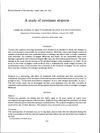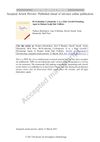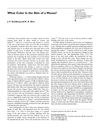 34 citations,
May 2012 in “International Journal of Molecular Sciences”
34 citations,
May 2012 in “International Journal of Molecular Sciences” Dieckol from Ecklonia cava may help hair growth and could be a potential hair loss treatment.
 34 citations,
June 1990 in “British Journal of Dermatology”
34 citations,
June 1990 in “British Journal of Dermatology” Etretinate treatment changed hair growth patterns in many patients.
 32 citations,
December 1969 in “The Lancet”
32 citations,
December 1969 in “The Lancet” Children with marasmus have more resting hair follicles and thinner, less pigmented hair, showing long-term malnutrition.
[object Object]  31 citations,
April 2007 in “Experimental Dermatology”
31 citations,
April 2007 in “Experimental Dermatology” Stress in mice delays hair growth and treatments blocking substance P can partly reverse this effect.
 31 citations,
June 2001 in “PubMed”
31 citations,
June 2001 in “PubMed” TrichoScan accurately measures hair growth and showed improved hair counts and thickness after finasteride treatment.
 29 citations,
March 2015 in “Journal of Investigative Dermatology”
29 citations,
March 2015 in “Journal of Investigative Dermatology” Cyclosporine A promotes hair growth and prolongs the active growth phase in human hair follicles, but may work differently than in rodents.
 26 citations,
July 2016 in “PLOS ONE”
26 citations,
July 2016 in “PLOS ONE” Activating β-catenin in certain skin cells speeds up hair growth in mice.
 26 citations,
May 2013 in “Marine Drugs”
26 citations,
May 2013 in “Marine Drugs” Ishige sinicola, a type of seaweed, may help hair grow by blocking a hair loss-related enzyme and boosting important cell growth.
 26 citations,
January 1994 in “McGraw-Hill eBooks”
26 citations,
January 1994 in “McGraw-Hill eBooks” Many hair loss conditions can be treated.
 26 citations,
March 1986 in “Clinical and Experimental Dermatology”
26 citations,
March 1986 in “Clinical and Experimental Dermatology” Scalp hair grows at 0.37 mm/day, forearm hair at 0.18 mm/day, and thigh hair at 0.30 mm/day, with no significant differences found in people with certain hair conditions.
 24 citations,
March 1995 in “British Journal of Dermatology”
24 citations,
March 1995 in “British Journal of Dermatology” Etretinate therapy can cause hair loss by disrupting the hair growth cycle.
 23 citations,
January 2020 in “Central-European Journal of Immunology/Central European Journal of Immunology”
23 citations,
January 2020 in “Central-European Journal of Immunology/Central European Journal of Immunology” Alopecia areata, a type of hair loss, is likely an autoimmune disease with a genetic link, but its exact cause is still unknown.
[object Object]  22 citations,
March 1987 in “Journal of The American Academy of Dermatology”
22 citations,
March 1987 in “Journal of The American Academy of Dermatology” Minoxidil prolongs cell life, slows aging, and may produce longer hairs.
 22 citations,
March 2009 in “Journal of Natural Medicines”
22 citations,
March 2009 in “Journal of Natural Medicines” Erica multiflora plant extract can help hair grow by stimulating growth-related cells and triggering hair cycle changes.
21 citations,
May 2016 in “Experimental and Therapeutic Medicine” MMP-2 and MMP-9 help hair grow, while their inhibitors peak when hair growth slows.
 21 citations,
November 2011 in “Veterinary Pathology”
21 citations,
November 2011 in “Veterinary Pathology” Mouse skin color ranges from pink to black, depending on their hair growth cycle.
 19 citations,
January 2016 in “Biological & Pharmaceutical Bulletin”
19 citations,
January 2016 in “Biological & Pharmaceutical Bulletin” Sargassum muticum extract and its component apo-9'-fucoxanthinone may help hair growth and treat hair loss.
 19 citations,
April 2016 in “Experimental Dermatology”
19 citations,
April 2016 in “Experimental Dermatology” Melanoblasts migrate to the skin using various pathways, and understanding this process could help with skin disease research.
 18 citations,
January 2007 in “Pharmaceutical Biology”
18 citations,
January 2007 in “Pharmaceutical Biology” Citrullus colocynthis extract is effective for hair growth, comparable to minoxidil.
 18 citations,
October 1984 in “International Journal of Dermatology”
18 citations,
October 1984 in “International Journal of Dermatology” Lithium therapy may cause temporary hair loss, with possible regrowth if treatment is stopped or continued.
 16 citations,
April 2007 in “Journal of Medical Primatology”
16 citations,
April 2007 in “Journal of Medical Primatology” The monkey's hair loss was due to an autoimmune disease, not genetics.
 15 citations,
February 2015 in “Cell & tissue research/Cell and tissue research”
15 citations,
February 2015 in “Cell & tissue research/Cell and tissue research” P-cadherin is important for hair growth and health, and its problems can cause hair and skin disorders.
15 citations,
September 2012 in “PTR. Phytotherapy research/Phytotherapy research” Ginsenosides Rb₁ and Rd may help prevent hair loss by promoting hair cell growth.
14 citations,
May 2017 in “InTech eBooks” Hair is important for protection, social interaction, and temperature control, and is made of a growth cycle-influenced follicle and a complex shaft.
 13 citations,
July 2004 in “Skinmed”
13 citations,
July 2004 in “Skinmed” Common types of non-scarring hair loss have various causes and treatments, but more effective solutions are needed.
13 citations,
January 1993 in “Archives of dermatological research” Human hair follicles can grow and stay healthy for up to 8 days in a lab setting.
 13 citations,
December 1991 in “Annals of the New York Academy of Sciences”
13 citations,
December 1991 in “Annals of the New York Academy of Sciences” Researchers created a lab model to study human hair growth, showing it can grow and self-regulate outside the body.
 12 citations,
May 2018 in “JAAD Case Reports”
12 citations,
May 2018 in “JAAD Case Reports” A man's gray hair got darker and thicker after using a psoriasis drug.
 12 citations,
January 2010 in “European Journal of Dermatology”
12 citations,
January 2010 in “European Journal of Dermatology” Norgalanthamine from Crinum asiaticum may help hair grow.
11 citations,
May 2022 in “Chinese medicine” Alpinetin helps grow hair by turning on hair stem cells and is safe for use.

























